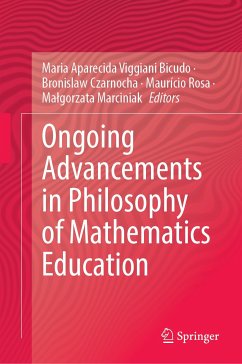Ongoing Advancements in Philosophy of Mathematics Education approaches the philosophy of mathematics education in a forward movement, analyzing, reflecting, and proposing significant contemporary themes in the field of mathematics education. The theme that gives life to the book is philosophy of mathematics education understood as arising from the intertwining between philosophy of mathematics and philosophy of education which, through constant analytical and reflective work regarding teaching and learning practices in mathematics, is materialized in its own discipline, philosophy of mathematics education. This is the field of investigation of the chapters in the book. The chapters are written by an international cohort of authors, from a variety of countries, regions, and continents. Some of these authors work with philosophical and psychological foundations traditionally accepted by Western civilization. Others expose theoretical foundations based on a new vision and comprising innovative approaches to historical and present-day issues in educational philosophy. The final third of the book is devoted to these unique and innovative research stances towards important and change resistant societal topics such as racism, technology gaps, or the promotion of creativity in the field of mathematics education.
Dieser Download kann aus rechtlichen Gründen nur mit Rechnungsadresse in A, B, BG, CY, CZ, D, DK, EW, E, FIN, F, GR, HR, H, IRL, I, LT, L, LR, M, NL, PL, P, R, S, SLO, SK ausgeliefert werden.
Hinweis: Dieser Artikel kann nur an eine deutsche Lieferadresse ausgeliefert werden.
Es gelten unsere Allgemeinen Geschäftsbedingungen: www.buecher.de/agb
Impressum
www.buecher.de ist ein Internetauftritt der buecher.de internetstores GmbH
Geschäftsführung: Monica Sawhney | Roland Kölbl | Günter Hilger
Sitz der Gesellschaft: Batheyer Straße 115 - 117, 58099 Hagen
Postanschrift: Bürgermeister-Wegele-Str. 12, 86167 Augsburg
Amtsgericht Hagen HRB 13257
Steuernummer: 321/5800/1497
USt-IdNr: DE450055826
Bitte wählen Sie Ihr Anliegen aus.
Rechnungen
Retourenschein anfordern
Bestellstatus
Storno


